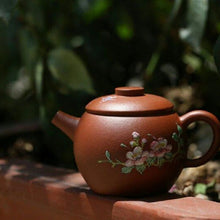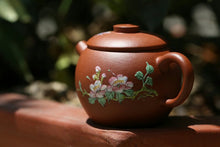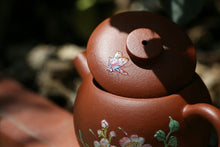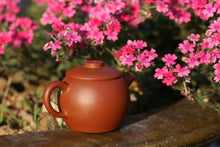This is an yixing teapot made from the rarer red clay known as "zhuni." As you can see from the photos, zhuni clay has a slight bumpy appearance. The clay will develop a shine from use. Zhuni clay is prized for its ability to preserve the full spectrum of flavour and fragrance of a tea. It is also the most difficult clay to fire as it is more likely to break during the process.
You can read more about zhuni clay in our blog entry here.
This teapot features a diancai 点彩 blossom and butterfly motif painting applied by a local artist. The design is painted by hand.
This teapot is the classic julunzhu style. This pot is known as "half-handmade" as the sculptor uses a molding tool to shape the body, and uses his hands for the handle, spout, holes, and smoothing out the body. In fact, no machine was used in it's shaping as the use of the tool is entirely manual.
You can read more about half handmade teapots in our blog entry here.
This pot holds approximately 80ml. It was made byLin Hanpeng and Chen Chunhong Studio.
Preparation Before Use
Yixing Teapots should be prepared before using the first time. This is called "opening the pot". It removes the dust from firing the teapot.
We recommend rinsing the teapot under warm water two or three times, then filling the teapot with boiling water and emptying it out two to three times. After this the teapot is ready for use.








